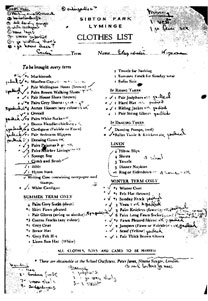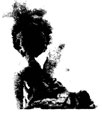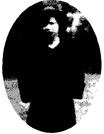Blow Out the Moon (9 page)

It looked like a clean, happy place. A comfortable-looking lady in a tweed skirt and two sweaters — one cardigan, one pullover — showed us around.
I liked it all until she opened the door of a dormitory. The beds were covered with thin, pale green bedspreads (exactly the same pale green as the desks at St. Vincent’s) and pinned to each pillow was a small piece of lined white paper (not cut out with scissors, but ripped by hand — neatly, but still ripped) with a girl’s name on it. All the names were in the same handwriting.
I took my mother’s hand and held it tightly; she looked down at me, a little surprised (I don’t usually hold her hand).
“What’s the matter?” she said, as soon as we were back on the sidewalk.
“It’s the best one we’ve seen so far, but … I don’t like it.” I didn’t like those pale bedspreads and little ripped pieces of paper, but that wasn’t a real reason. “There’s just something about it that isn’t quite right.”
Then I thought of one good reason, something that would make sense to her.
“And it’s not in the country, though it’s nice that it’s by the ocean.”
My mother smiled, but it was a tired smile, I thought.
“Maybe Daddy will find something!” I said.
“Maybe he will,” she said, and
that
smile looked happy.
I was right. One night he came home and said he’d found the perfect school.
“I drove down to Kent after lunch, and as soon as I saw Sibton Park, I knew it was the one,” he said, more to my mother than to me; then he laughed a little, almost as though he was embarrassed. “I fell in love with it.” He handed me a small, thin booklet. “ ’Ere ’ave a butcher’s at this!”

The brochure cover.
Inside it said:
Sibton Park is a beautiful Queen Anne house standing in its own grounds of 88 acres…the foundations of the house go back to the reign of Edward III.… Each girl is encouraged to explore her own potential and to take pleasure in the success of others as well as her own. We believe in the old-fashioned value that consideration for other people is at the root of good manners.… Children whose parents are abroad may spend all or part of the holidays at school. It is Mrs. Ridley-Day’s home and the school is never closed.
The grown-up code — the rhyming slang! Have a butcher’s hook (look) at this.
The booklet showed a big, rosy-brick building surrounded by fields. SIBTON PARK it said in blue letters. It sounded like a Jane Austen novel.
Inside were pictures of meadows with horses, and girls riding, and girls in the stable petting a horse (it was in a loose box, with bars at the top, exactly like the ones in the happy part of
Black Beauty
), and girls in their pajamas on their beds, talking. It looked better than the boarding schools in the books: older, more strange and magical, more like the house in
The Secret Garden
than a school. There was a little map of the school and grounds, and there were gardens all over: a rose garden, a Tudor garden (what was that?). Meanwhile my father was excitedly telling my mother about the headmistress, and how old the house was (some parts were almost seven hundred years old, he said); I didn’t really listen until his voice changed. By the change, I could tell something was wrong.

A picture from inside the brochure.
“Term starts the day after tomorrow,” he said.
“But she’ll need lots of new clothes, and I’ll have to sew name tapes on everything — couldn’t she go a day or two later?”
He shook his head. “They won’t take children once the term has started. I have the clothes list right here,” he said quickly, eagerly. She didn’t say anything, and he went on: “Mrs. Ridley-Day said you can get all the uniform things at Peter Jones, and that they can send whatever she won’t need right away straight to the school.”
He pulled a piece of paper out of his pocket and my mother and I both looked at it.
“Jodhpurs, a RIDING jacket!” I said. “Oh, Daddy! Can I take it to show Emmy?”
“I signed you up for ballet, too,” he called after me; as I ran out I heard him talking excitedly and my mother sort of laughing and saying, “Honestly, Art!”
My mother and I went shopping right after breakfast. First, she ordered name tapes (a long strip of white material with your name on it over and over in little capital letters: you could choose the color of the letters and I chose blue), and the man PROMISED that they would be ready by the end of the day. These had to be sewn inside all my clothes, even the socks, my mother said. She was worried about getting it done on time.
“I’m such a slow seamstress.”

This is the list, with my mother’s notes and check marks. Walking shoes laced up and had thick soles. House shoes were like Mary Janes, only made of brown leather. The shorts were culottes: they were made out of wool. “Fawn” was a sort of warm beige color. “Knickers” were brown and a little bigger and heavier than underpants. You wore them OVER your underpants (why you needed them I never knew). “Vests” were undershirts
.
I had to try on a lot of clothes. The only interesting ones were the string gloves for riding — they really did look and feel like they were made out of string! Maybe they were! They didn’t have the jodhpurs and tweed jacket in my size. The man who measured me seemed surprised that I was going away to school, and when my mother said I was eight he said, “She’s a bit small for her age, isn’t she?”
It was true. I kept hoping that someday I would get taller; both of my parents are tall, and Emmy was tall for her age, too. In fact, by this time we were about the same height. But, so far I hadn’t grown.
My mother and Jill started sewing on the name tapes as soon as we got home — my mother’s stitches were tiny and perfectly even. As soon as things were done my mother checked them off on her list and put them in a trunk.
There was also a small brown suitcase called an “overnight case.” She packed a dressing gown like the ones the girls in the books had and pajamas and a “sponge bag” — that was a pink plastic bag filled with soap, a washcloth, shampoo, a toothbrush, toothpaste, and a brush and comb. She said I could put the rest of the things of mine that I wanted to bring in this case myself, and that I could choose what to take.
I didn’t bring the dolls — in the stories no one had dolls and it wouldn’t be any fun to play with them without Emmy anyway. I chose
Pride and Prejudice
(the book about the five sisters; my parents had given me my own copy for Christmas),
Little Women, Melissa Ann
(a book about an orphan), and a fat blue book called
Blackie’s Schoolgirl’s Omnibus
that had three novels about boarding school in it. I wrote my name and our address in America in each book. I packed the card with Henry’s address on it and all his letters inside the books so they wouldn’t get ripped. I was going to leave the fortune-catcher at home, but then I unfolded it and put it in, too, very carefully. And I put in the diary and pen I had gotten for Christmas — I’d only written in the diary once, but maybe at the school I would want to. I put in an ink bottle, too, but my mother took that out.
“But then how can I write?” I said.
“They’ll have ink at the school,” she said quietly, without looking up from the ink bottle in her hand.
When she did look at me, I thought she looked a little sad, but then she smiled and said, “You’ll have a lot to write about, and you can write letters to all of us to tell us what it’s like: I’m putting in lots of envelopes and stamps. Daddy and I will write to you, of course, and Emmy, too — it will be good practice for her — and Willy and Bubby can draw pictures.”
When I woke up the next day, the day I was leaving for boarding school, it was very sunny.
“Emmy! Are you awake?”
She didn’t answer, so I got out of my bed and went over to hers. She sat up slowly and sleepily.
“I want to ask you something very important,” I said. “Guard my dolls. Don’t let Willy and Bubby play with them. You can check on them, but we’ll still have the rule about not working each others’. Okay?” She nodded. “Promise?”
“I promise.”
“Good.”
The dolls said good-bye to each other, and then I put all mine in their own beds, under the covers, and put the beds inside the white chest.

It was a school day for Emmy and Willy, and Jill was taking Bubby with them, too, because by the time she came home, my parents and I would be at the train station. I followed them all to the front door. Willy and Bubby kissed me good-bye, and I kissed them back and gave them each a hug.
Emmy and I looked at each other, and then she started to cry.
“Emmy, don’t cry!” I said. “Please don’t cry! It’s not very long until May sixteenth!”
(That was the first day they would be allowed to visit me, and of course they would come.)
“That’s right, buck up!” Jill said.
We both ignored her.
“But it won’t be the same — it won’t be the same ever again,” Emmy said, still crying.
I thought that was probably true; but I didn’t say so. I said, “Think of your pet bird!”
My parents had promised to get her a budgerigar — a small parrot people in England have as a pet — as a sort of consolation present for me going away.
Then I made our “I hate this” face (the one I always made before I walked upstairs to my London classroom) and Emmy sort of smiled and made hers back at me, and then they left. … I stood in the doorway, and after a few steps, Emmy stopped. She turned around, with her hands still in her pockets, and we looked at each other one last time, and then I waved and ran into the house.

